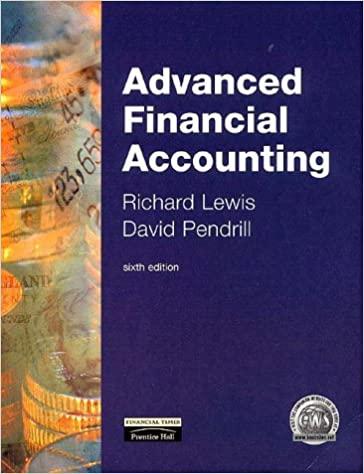Air Fare plc is the subsidiary of an American parent company. It had been incorporated in the
Question:
Air Fare plc is the subsidiary of an American parent company. It had been incorporated in the United Kingdom in 1985 to provide in flight packed meals for American airlines on return flights from the United Kingdom.
The fixed assets in the annual accounts have been carried at cost less depreciation but the directors have been considering the production of supplementary statements that are based on current values and show a profit after maintaining the operating capital and also a profit that encompassed gains on holding assets to the extent that these were real gains after allowing for general/average inflation.
The following information (i) to (vi) was available when preparing the supplementary statements for the year ended 31 December 1993.
(i) Draft profit and loss account for the year ended 31 December 1993 prepared under the historic cost convention.

(ii) The current cost values of the net assets representing shareholders' funds was \(£ 25\) million at 1 January 1993.
(iii) Freehold premises had cost \(£ 8\) million in 1985 and were being depreciated over 40 years which was the group policy specified by the American parent. The current gross replacement cost was \(£ 14\) million at 31 December 1993 and \(£ 13.8\) million at 1 January 1993.
Equipment had cost \(£ 12\) million in 1991 and was being depreciated over 15 years. The gross replacement cost was \(£ 12.6\) million at 31 December 1993 and \(£ 12.5\) million at 1 January 1993.
(iv) The cost of sales had increased by \(£ 412000\) during the year due to price increases. The costs and price increases occurred evenly during the year.
(v) The retail price index had risen by \(3 \%\) during the year.
(vi) Stock at the beginning of the year was \(£ 660000\) at cost and \(£ 670000\) at current replacement cost and stock at the end of the year was \(£ 750000\) at cost and \(£ 795000\) at current replacement cost.
The following information relates to a consideration not to provide for depreciation on the freehold property.
The freehold property consisted of the premises where the meals were prepared and packed. When the directors were reviewing the information prepared for the current value supplementary statements they noted that the current value of the freehold property exceeded the book value and decided that it was appropriate not to provide for depreciation.
The chief accountant advised them that it was probable that the auditor would qualify the accounts if depreciation were not provided in accordance with the provisions of SSAP 12 Accounting for Depreciation.
The directors had been discussing the problem over lunch at the local hotel and were surprised when the owner of the hotel informed them that the auditor of the company that owned the hotel had not required depreciation to be provided on the hotel premises. Further enquiry by the directors established that there were a number of companies that were not providing depreciation on freehold properties from a range of industries that included hotels, retail shops and banks. They even discovered that the Financial Reporting Review Panel had accepted one company's policy on non-depreciation of freehold buildings in respect of the accounts of Forte plc. They had therefore formed the view that non-depreciation was acceptable provided the auditors were offered and accepted the company's reasons.
They accordingly requested the chief accountant to prepare a brief report for the board of reasons to support a decision by the company to adopt an accounting policy of nondepreciation which they could subsequently discuss with the auditors.
Required
(a) (i) Prepare a profit and loss account that shows a result after maintaining the operating capital and also a result that encompasses the gains for the year on holding assets to the extent that these are real gains after allowing for inflation.
(ii) Write a brief memo to the directors explaining the results disclosed in the profit and loss account prepared in (i)
(10 marks)
(b) As chief accountant, prepare a brief report for the board giving reasons to support a decision by the company to adopt an accounting policy of non-depreciation of the freehold property.
Step by Step Answer:

Advanced Financial Accounting
ISBN: 9780273638339
6th Edition
Authors: Richard Lewis, David Pendrill





